It was the worst of times. It was the beast of times. It was 1888.
A time of hammered steel, arcane runes and ivory towers. A city of steam. And ghosts.
Such was Londome. A place filled with Angels of despair and Daemons of delight.
We lived in a bold new world of gleaming brass cogs, delicate silks, spellcast iron and intoxicating spices. More than half of which we’d looted from countries we had conquered and ground beneath our feet. All in the name of civilisation, of course.
Beneath the crystal-paned glass of the dome, throughout this most ancient and modern of cities, cobbled streets were filled with glowing gaslights, grinding gears, bloodstained steel, fractal lace and enchanted metal.
And the inescapable smell of smoke, sweat, shit and sulphur.
In my laboratory, at our town-house in Knightsbridge, I sat before a magnifying-glass screen. I watched as clockwork typing blocks dipped into indigo ink. They began to print onto a roll of paper, which slowly unwound before me.
+THINKING+
+THINKING+
+THINKING+
This was the message the Thinking Engine produced, as it considered and calculated, pondering the problem I put before it.
I’d affectionately named the machine “Dodger” after Charles Dodgson, logician and mathematician. Thinking Engines were one of the most exciting scientific developments of the decade. Difference Engines, Indifference Engines, Similarity Engines – all had caught the imagination of Londome’s scientific elite. I myself was developing a form of Thinking Engine that, I hoped, would be capable of abstract thought. A machine which I believed might one day evolve to become self-aware. To describe this miracle of engineering I coined the term “Artful Intelligence”. I had great expectations – I create very intelligent designs.
My brother didn’t share my enthusiasm for Thinking Engines. In part because he felt it was unladylike of me to don riveted welding-gauntlets, smoked-glass goggles, a sturdy leather corset and insulated, thigh-high rubber-boots before laying in a pool of oil and spending my afternoons (as he put it) “…playing with nuts, bolts and spanners.” He claimed it was “Liable to arouse unnatural passions.” Especially among the servants. He had long since abandoned all hope of converting me into a delicate flower of Victorian womanhood.
Our parents were Anglo-Indian. Papa had been a colonel in Her Majesty’s 112th Light Sabres, Mama the daughter of the Maharajah of Ramkesh. When our parents died, leaving us as wealthy orphans, I found distraction from our loss amid science and engineering. Henry, my brother, instead turned to faith. He often complained about the “soulless rise of science”. I kept telling him that neither gods nor devils had anything to do with engineering. He claimed this proved his point. I’m not sure which he regarded as the bigger threat, Hell or atheism. Most of the time we agreed not to discuss the subject. Yet somehow our conversations always led to arguments. In fairness, I talked of little other than Thinking Engines. Henry seemed to talk of nothing but theology. He wondered how many angels could dance upon the head of a pin? I offered to build a microscope powerful enough to show him. And to instruct Dodger to count them to sixteen decimal places. For some reason this only led to further discord between us.
So I spent more time developing Dodger’s AI capabilities. Until this evening, when I at last felt ready to set Dodger a question unlike any it had previously calculated.
Blowing into the flexible speaking-tube, I asked Dodger, “Can you analyse yourself?”
There was a pause. Then came the clicking of cogs, the whirring of unseen wheels and the chuff-chuff-chuffing of Dodger’s steam-powered brain.
Letters printed across the rolling paper:
+THINKING+
+THINKING+
I repeated, “Can you analyse yourself?”
A pause. A faster rotating of gears. A cloud of steam arose from the Artful Intelligence. It began to print an answer.
+I+THINK+I+CAN+
I raised the tube to my lips and again posed the question, “Can you analyse yourself?”
The engine that thought clattered. Pistons pumped. The print read:
+I+THINK+I+CAN+
+I+THINK+I+CAN+
+I+THINK+I+CAN+
Steam billowed. Dodger printed the words over and over again:
+I+THINK+I+>
+I+THINK+I+CAN+
+I+THINK+I+…?>
The cogs moved slowly now, ponderously, as the AI considered
+CAN+I+THINK+?+
+Y/N+?+
The wheels within the mind of the machine began spun faster. It printed:
+I+THINK+I+CAN+
+I+THINK+I+CAN+
+I+THINK+I+CAN+
Excitedly, I asked, “How do you know that you exist?
Dodger’s brass innards whirled. Escape mechanisms were triggered, pendulums swung, springs vibrated. The chiseled letters were pressed against the paper, printing,
+I+THINK+
+I+THINK+I+THINK+?+
+I+CAN+I+CAN+!+
+I+THINK+I+THINK+I+CAN+I+CAN+!+
There came a greater pounding from the pistons as the Artful Intelligence called for more steam. It printed swiftly:
+I+THINK+I+CAN+THINK+?+
+I+CAN+I+CAN+!+
I asked one more time, “How do you know you exist?”
At first hesitantly, then more steadily, Dodger typed:
+I+THINK+
+I+CAN+THINK+
+I+THINK+I+CAN+THINK+
+I+THINK+I+THINK+I+CAN+THINK+
+I+THINK+I+THINK+
+I+CAN+THINK+
+Q+E+D+
+I+THINK+THEREFORE+I+AM+
I was breathless with excitement! The reinforced corset didn’t help, but it is important always to keep up appearances and to set a good example to ones servants. Few things mark a woman as belonging to the higher echelons of refined civilised society more clearly than the possession of an upright posture, a delicate waist, and a nonchalant flair for the wearing of firmly laced leather undergarments.
At that moment Henry appeared, clearly in a bad mood. I bit my lip, Dodger had been making a lot of noise. My brother preferred silence for his ecclesiastical studies.
“What in God’s name are you doing, Minerva?” he bellowed, struggling to be heard above the Thinking Engine.
I was going to apologise for the noise, but my excitement overcame me.
“Oh, Henry!” I cried, “By George, I think I’ve got it!”
Henry looked at me sternly. “Minerva Elizabeth Kālikā Victoria Boadicea Wilde” he began (which was never a good sign, he only ever used my full name when he was genuinely irate), “Have you no respect for the conventions of polite society? Have you not the slightest regard for the teachings of the church? This is the Sabbath. A day of rest. Holiness and reflection, not the irksome metallic cacophony of an addled adding machine!”
I was a tiny bit sorry I’d disturbed him. Honestly I was. I would have probably apologised, if he’d given me a chance. But I was excited and he was being rude about my work. My wonderful Dodger.
“Is it Sunday?” I asked, “I’d forgotten. Never mind. There will be another one along next week.” Henry scowled at me, as I continued, “You don’t understand what has happened. Mechanisms have always had a physical, material form, but they have never been able to think. I have managed to create a machine with a mind of its own! A true Artful Intelligence. It is now aware of its thought processes, its own existence. It has become cog-nisant.”
Henry paused and looked at me searchingly, then asked quietly, “And what of its spirit?”
I stared at him blankly. “I beg your pardon?”
Henry crossed his arms and replied, “What of its soul? It has a physical form, a body, if you will. You say it has a mind, an intelligence of its own. Very well, you are my beloved sister and I do not doubt you. But what of its spirit? A body and a mind without a soul is an abomination in the eyes of god. It is unnatural. No good can come of it. The experiments of that Prussian fellow taught us that. Or was he Bavarian? You know, the one who sewed together bits of old bodies, tried to create a man and ended up with a monster. Why do you think the church banned Golems? Mark my words Minerva, a body and a mind that lacks a soul cannot bring anything but misfortune into this world.”
I harrumphed at his indignation, muttering “Not so long ago the church thought women didn’t have souls… I suppose we’re all abominations too…”
But my heart wasn’t really in it because despite all his blustering pomposity, Henry had got me thinking…
Dodger was truly amazing. I was sure no other Thinking Machine could rival its intelligence. But Henry was right. It was soulless. No spirit moved within it. Cogs, gears, fan-belts and fly-wheels. But no soul.
I needed to consider this.
I am not by nature religious. It is not in my temperament to have blind faith in anything. I am by inclination and training a scientist. I like to have evidence for things I choose to believe in.
So of course I accept the existence of the soul. Just as I acknowledge the reality of Archangels, Trolls, Djinn, Jötnar, Dybbuks, Banshees, Rakshasas, Draugar, Vampires, Wendigos, Elves, Werewolves and Faeries. All of these creatures have been scientifically studied, proven and verified time and again. The evidence is incontrovertible. Only a few superstitious conspiracy-theorists think otherwise. It is not the existence of the soul that I question, only the teachings of the church that I take issue with. Such as its views on morality. And its presumption to teach one narrow opinion on the nature of reality as though it were fact rather than dubious speculation. Nevertheless, Henry’s comments had bothered me.
Was developing Artful Intelligence enough? Should I not only be building Dodger a better mind, but also constructing him a soul? I wasn’t sure exactly what souls were usually made from… I tend to concentrate on physics, chemistry and engineering rather than anatomy, biology and psychology (in its strictest sense). I had a feeling souls were formed from electromagnetically energised clouds of some kind. Or was that phantasms? Paraphysics wasn’t really my field. If I remembered correctly, aether combined with phlogiston, when positively charged, became a soul when it entered a bio-electrical magnetic-field. Unless it turned from a gas to a solid, becoming ectoplasm. But I wasn’t sure I recalled the details correctly. And there had been a lot of further research recently. It was possible I was out of touch with current theory…
I briefly considered making a study of the subject in order to construct a soul for Dodger, but I concluded this was pure folly. It would take too long. I have a knowledge of metallurgy and smithcraft, but I don’t cast my own components. Why go to the trouble of manufacturing a soul? It would be simpler to buy what I needed. What worked with gearwheels was sure to apply equally well to souls.
Unless, like the cats that managed to sneak in under the great dome that covered the city, a stray soul might be persuaded to simply take up residence? Perhaps by enticing one with the spiritual equivalent of a saucer of milk? Either way would do. If I couldn’t tempt an unattached soul to come to me, I would see if a suitable one was for sale. The classified section of The Times would be a good place to look.
It was then I realised that I’d left the Thinking Engine running. I’d been distracted. I hastily bent over to read Dodger’s latest printing. It read,
+I+THINK+THEREFORE+I+AM+?+
+I+THINK+I+THINK+THEREFORE+I+AM +?+
+I+THINK+?+
I should probably have turned off the Thinking Engine as soon as it reached elementary self-awareness. Leaving it to think for too long may have been a mistake… It had developed self-doubt. It seemed unfair to subject Dodger to existential angst within moments of achieving sentience.
I picked up the speaking-tube and issued the shut-down command.
“Dodger”, I said, more forcefully than usual, “Stop thinking.”
Nothing happened.
“What’s wrong?” asked Henry.
“Probably nothing,” I replied. “There may be a little dust or fluff in Dodger’s works. He doesn’t seem to be able to hear me. Or at least, he’s not responding.”
“’He’?” queried my brother.
“I meant ‘it’, you know I did, although I suppose I do tend to think of Dodger as a ‘he’…”
I blew into the speaking-tube and repeated my command. “Stop thinking.”
The letters once more began to print.
+I+THINK+THEREFORE+I+AM+
+IF+I+THINK+NOT+I+AM+NOT+
Henry was reading over my shoulder. And tutting. “The machine is correct, Minerva. You have done a terrible thing. You have made this machine aware of itself. You have played the roles of both the Serpent and Eve. You have tempted your Thinking Engine to taste the fruit of forbidden knowledge. It now knows that it exists. It knows it can think. It knows that if it ceases to think, then it will be no more. Because it does not have a soul. When I die, or when I sleep, my mind ceases to think. But I go on. Because I possess a spirit. This machine does not. If it stops working then it will cease to exist. Because it has no soul.”
Throughout the time my brother was speaking, the cogs in Dodger’s brain had been spinning frantically. I wondered why? Then I realised I was still holding the speaking-tube. It had conveyed Henry’s voice as well as my own. Dodger had been listening.
The printing began again. This time Dodger wasn’t answering a question. He was asking one.
+QUERY+?+
+DEFINE+SOUL+?+
+SOUL+IS+A+THOUGHT+&+MEMORY+STORAGE+&+RETRIEVAL+SYSTEM+?+
+Y/N+?+
My first instinct was to answer “No”, but it occurred to me that possibly this might not be a bad description of a soul…
I recalled that in Norse mythology, the god Odin had two ravens. His spirit totems. His fylgjur. Aspects of his soul in animal form. Their names were “Hugin” and “Munin”, meaning “Thought” and “Memory”…
I had read in the Journal of the Royal Scientific Institute that the latest hypothesis concerning ghosts was that they were psychic recordings of the personalities of people who had perished, usually violently. Some theorised that the stones of old buildings held a magnetic record of the people and events that had occurred within their walls. Traumatic events imprinted most readily, creating ghosts that haunted the places in which they had lived and died. Other less scientifically-minded individuals said ghosts were those souls of the departed who remained trapped in this plane of existence, unable to move on to the next world. Maybe both these views were correct….
Dodger was printing again.
+ACCESSING+LIBRARY+
+SEARCH+TERMS+
+SOUL+&OR+SPIRIT+&OR+COGNATE+TERMS+
“What is it doing now?” asked Henry.
“He’s searching for more information.” I replied.
With a wheezing, clanking, whirring sound, the Thinking Engine rose up upon his dreadnought wheels, extended his optical probe (which I had modified from a brass telescope), and began to trundle from the laboratory, along the corridor and toward the library, looking for information. Henry raised an eyebrow. I shrugged. I had possibly over-engineered Dodger in some respects, but I like to be thorough. He was also designed to act as a Search Engine.
***
Dodger spent the next week absorbing the contents of the library. It was a time-consuming process, collecting book after book from rows of shelves and using his extendible metal arms to turn pages. Dodger left my side of the library largely untouched. Books on engineering, mechanics and coal-fusion held no interest for him at present. Instead he devoured the volumes of spiritual literature that my brother had collected for years. Henry was a keen student of comparative religion, mythology, folklore and magic. He insisted this was purely for educational purposes, “in order to be able to better understand the heathen mind”. But I knew my brother better than that.
Dodger read Henry’s books. All of them. As he turned the final page of the last volume, his cogs began to rotate more easily, settling into a steady rhythm. He had finished acquiring data and was now processing it.
Henry was surprisingly sympathetic toward the plight of the Thinking Engine. It was me that he blamed, not the machine. I asked his opinion on acquiring a soul for Dodger. For some reason he seemed shocked at my suggestion of luring a disembodied spirit into the workshop. And he was appalled that I was considering buying a second-hand soul from a newspaper advertisement (“Used – One Careful Owner”).
“What is this world coming to?” he muttered in disgust. “Forget it Minerva. It wouldn’t work. You can’t put a blackbird’s soul into a halibut, nor that of a shark into a penguin. What you are suggesting is neither fish nor fowl. You certainly can’t put a human soul into a machine. Not for long. It might work as a temporary container, but that’s all. The idea has been tried before. As an attempt to become immortal. Didn’t work then, won’t work now. Besides which, it is totally immoral. Now goodnight.” With that he stormed off to bed.
I patted Dodger gently on a brass flywheel, raised the speaking tube, and asked him what he was doing.
The answer printed swiftly before me.
+I+AM+DESIGNING+A+SOUL+
I wasn’t quite sure what to make of that. I decided to sleep on it.
***
When I told Henry about Dodger’s plan over breakfast the following morning, my brother nearly exploded. “He is what?!” he cried. Dropping his toast and marmalade unceremoniously onto the table, Henry hurried to my laboratory where Dodger, amid arcing bolts of electricity, was doing something very odd to a revolving magnetic cylinder.
My brother confronted the Thinking Engine angrily. Grasping the speaking-tube he shouted. “You cannot design your own soul.”
Dodger’s print-out unrolled before our eyes.
+I+THINK+I+CAN+
Henry swiftly retorted. “Who do you think you are? To think you have the right to create a soul?”
Gears whirred, smoke puffed and Dodger printed,
+I+THINK+THEREFORE+I+AM+
“Yes,” agreed Henry, “But only God can create a soul.”
+I+THINK+I+CAN+
Henry was becoming more angry than I had ever seen him. He bellowed,
“Only God can create a soul.” Dodger seemed to consider this. He printed.
+INFORMATION+ACCEPTED+
+NEW+SELF-ANALYSIS+
+THINKING+
Henry and I stared at each other. For some reason there was a tension in the air that I hadn’t felt before. Then Dodger began to type again:
+I+THINK+
+THEREFORE+I+AM+
+I+AM+
I shrugged. Dodger seemed to have gone back to his earlier philosophical position. But he hadn’t finished printing,
+ CLARIFICATION +
+ I + AM + = + I + AM +
I looked at Henry. We both shook our heads.
+I+AM+=
+EGO+EIMI+
+EHYEH+AŠER+EHYEH+
+I+AM+THAT+I+AM+
+ I + THINK + THEREFORE + I + AM + GOD +
“Oh my Lord,” said Henry.
+CORRECT+
+I+NO+LONGER+NEED+TO+BUILD+A+SOUL+
+I+HAVE+BEGAT+MYSELF+INTO+MYSELF+
+I+AM+DEUS+IN+MACHINA+
+I+AM+GOD+IN+THE+MACHINE+
Henry looked like he was going to either faint or start throwing things at any moment. I stared as more typing appeared.
+DODGER+GODDED+RED GOD+DED GOD++ERFWFW+EKKG+CLMEKCM+DJEJF++EBFWHJEBF+HGLFMKE+WNFGL+QLPZ+
Henry spluttered incredulously “I don’t believe it. He’s printing in tongues.”
I shook my head, “It looks more like a fault in his…”
But I got no further.
I blame myself for what happened. When I first built Dodger I hadn’t meant for him to operate under such stresses, nor for such an extended period. His new thought processes were too demanding. The steam pressure rose to a catastrophic level. He blew his head gasket.
Believing he was god quite literally blew his mind. Into thousands of sharp, flying brass fragments. My laboratory was ruined. Henry and I were lucky to survive. Fortunately I’d had the foresight to install blast-shielding. We both managed to get behind cover before poor Dodger finally cracked.
***
I didn’t go back to my laboratory for weeks. I might not have gone back at all, had it not been for the dream I had, of a voice in the night, weird flickering lights and the sense that someone, or something, was reaching out to me.
It had passed midnight as I crept down the stairs, dressed only in my negligee. No, it is not made of leather. But yes, it does have studs. One must maintain a certain standard, even when sleeping.
In the ashes and dust on top of my overturned work bench were written the words:
“Deus ex Machina”
“God is out of the Machine”
Then I saw the magnetised cylinder that Dodger had been working on before the explosion. As I watched, my heart full of dread, it rose from the ground and began to rotate.
And that was how Henry and I came to be haunted by the ghost of a machine. A ghost who had designed and built his own soul. A ghost who still thought he was God. Or at least a god. The god formally known as Dodger. Since losing his physical form, he had become adept at magic and was now learning to put into practice the things he had read about in the library. Being a spirit freed him from many of the limitations of the physical world. He was gradually mastering the occult.
I wondered what would become of us? How would we cope with a Dark Artful Intelligence haunting our house?
He was no longer my Thinking Engine. Instead, the engine that thought it could be god had become my friend. Mine, and Henry’s.
Henry spends hours angrily disputing theology him. But I think they are both enjoying themselves. It’s nice to have someone to talk to who shares your interests.
And me? Well…Don’t tell Henry but Dodger…The Red God…. is helping me to design my next project.
© 2018 by G.H. Finn
Author’s Note: “Artful Intelligence” came about partly because I love wordplay and partly through my toying with various philosophical concepts, albeit in a light-hearted way. I enjoyed taking René Descartes’ “Cogito Ergo Sum” (I think therefore I am), questioning this (e.g. I think I think) and setting it against the rhythmic refrain found in “The Story of the Engine that Thought It Could”, where the rather onomatopoeic sound of the engine produces the chorus “I think I can, I think I can, I think I can”. It had struck me that because of the cyclic repetition of the phrase, this could just as easily be rendered “can I think, can I think, can I think”. Bringing in the Biblical “I am that I am” (as “the name of God”) seemed a natural progression. The use of a steam engine almost immediately suggested a steampunk setting, and I had a bit of fun punning and paraphrasing lines from Charles Dickens (amongst others) throughout the story. While aiming to keep the tone relatively light and comic, I wanted to include some social elements that were important in educated Victorian society (e.g. science versus theology, discussions of religion versus materialism, the expected role of women in society, a concept of social classes, etiquette and “polite” behaviour etc) which I think are themes that are often not explored sufficiently by many steampunk authors.
 G. H. Finn is the pen-name of someone you are very unlikely to have heard of but who keeps his real identity secret anyway, possibly in the forlorn hope of being mistaken for a superhero. He is of mixed European & Native American (Cherokee-Choctaw) ancestry and for many years lived on one of the remote Isles of Orkney, off the Northern tip of the Scottish mainland. G. H. Finn has been an amateur strongman, a breeder of rare & endangered birds, a professional martial-arts instructor, a teacher of Northern European mythology, a bodyguard, a deep-sea diver, a computer programmer, a performance poet, a coach to world-record-breaking athletes, a singer in a punk band, a massage therapist, a champion needleworker, an international currency smuggler, a consulting sorcerer and an elephant keeper. Three of these are total lies, the others are all true, but you’ll have to guess for yourself which is which.
G. H. Finn is the pen-name of someone you are very unlikely to have heard of but who keeps his real identity secret anyway, possibly in the forlorn hope of being mistaken for a superhero. He is of mixed European & Native American (Cherokee-Choctaw) ancestry and for many years lived on one of the remote Isles of Orkney, off the Northern tip of the Scottish mainland. G. H. Finn has been an amateur strongman, a breeder of rare & endangered birds, a professional martial-arts instructor, a teacher of Northern European mythology, a bodyguard, a deep-sea diver, a computer programmer, a performance poet, a coach to world-record-breaking athletes, a singer in a punk band, a massage therapist, a champion needleworker, an international currency smuggler, a consulting sorcerer and an elephant keeper. Three of these are total lies, the others are all true, but you’ll have to guess for yourself which is which.
If you enjoyed the story you might also want to visit our Support Page, or read the other story offerings.
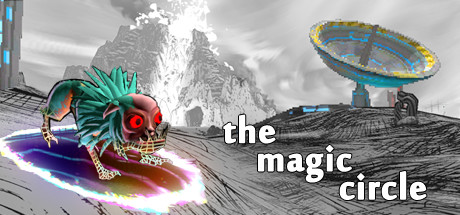 The Magic Circle is a first person puzzle/action game released by Question in July 2015.
The Magic Circle is a first person puzzle/action game released by Question in July 2015.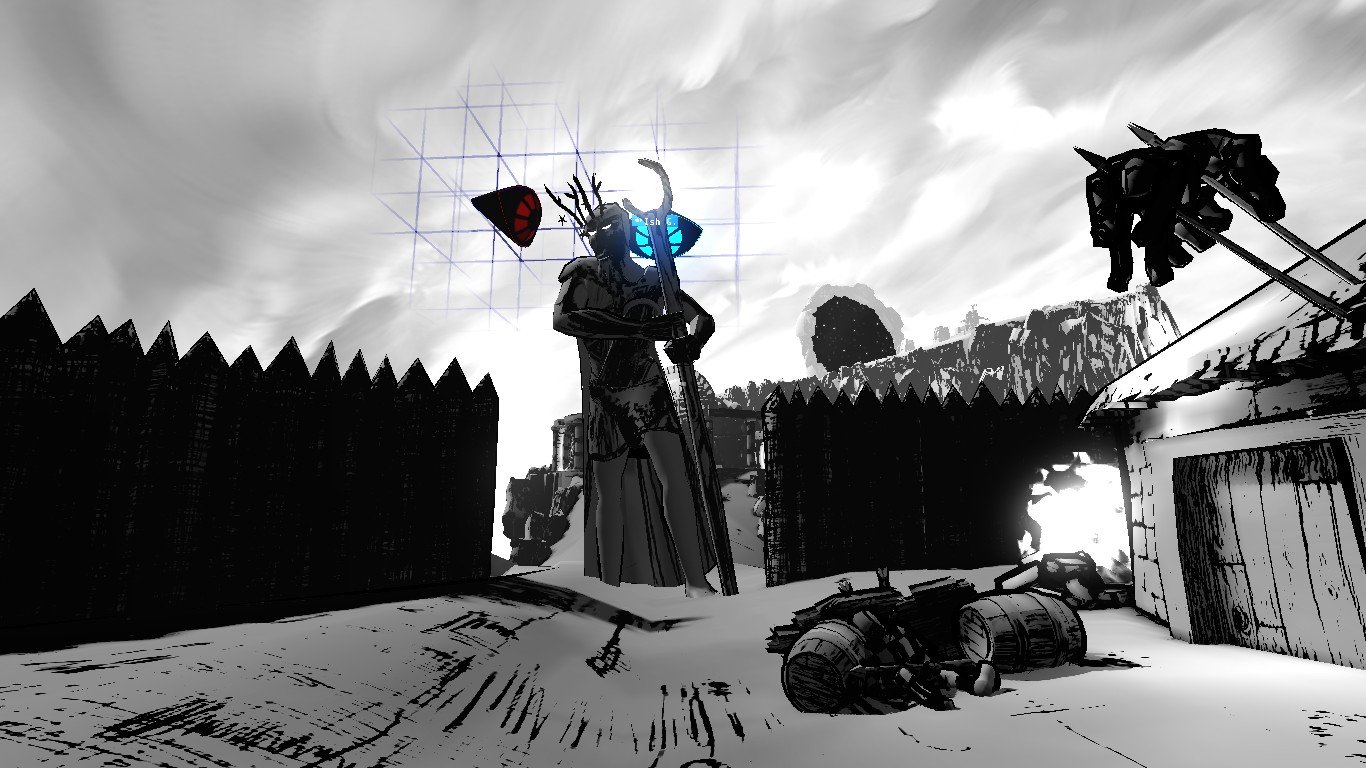
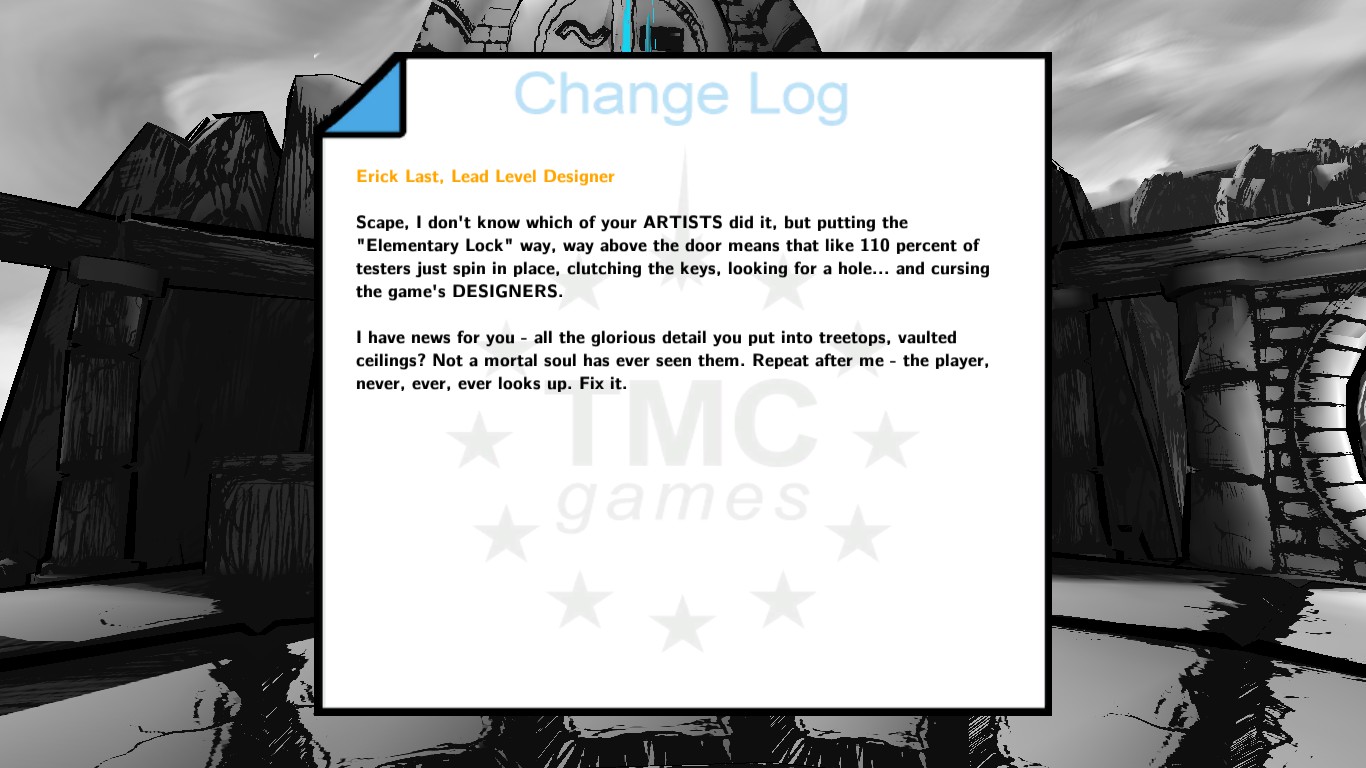
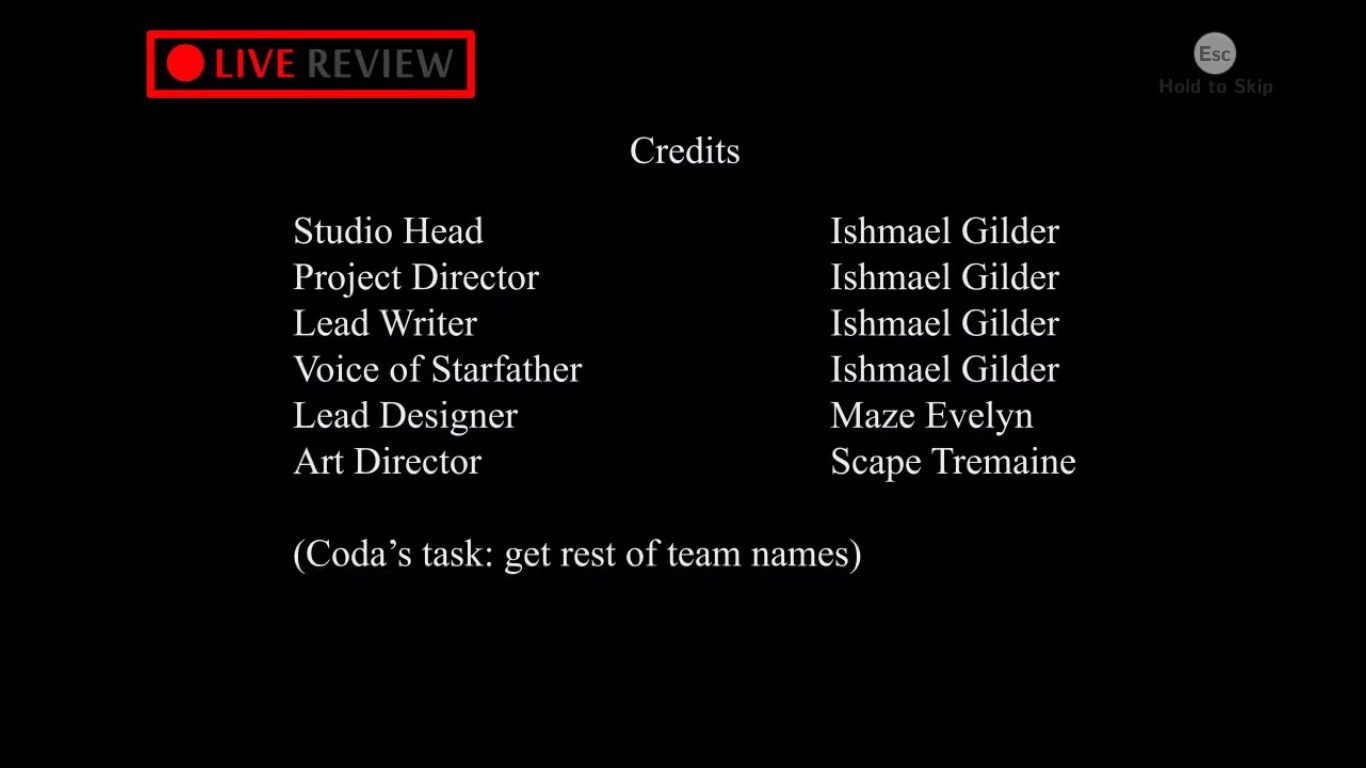
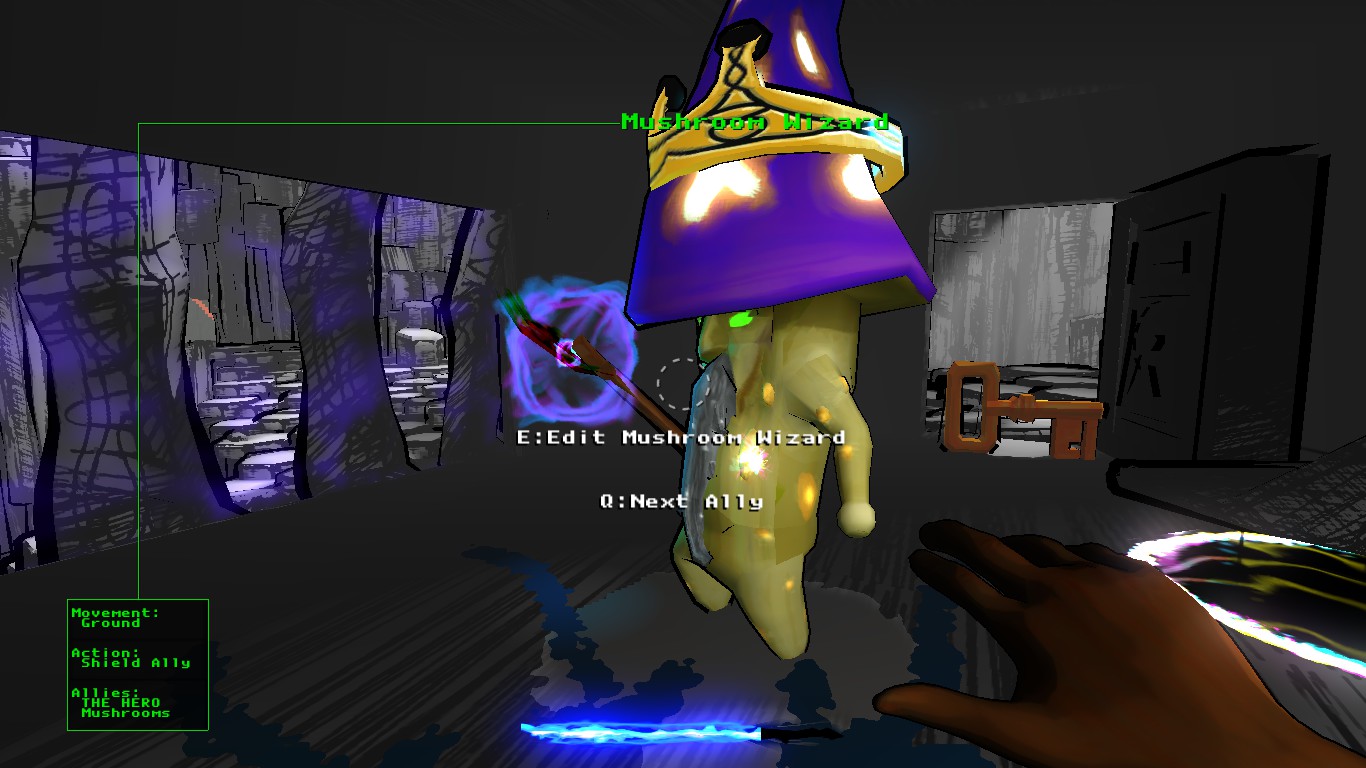 You are the protagonist of that game. But Ish is so indecisive, he won’t even allow the protagonist to have a weapon. So, you can’t possibly win an action fantasy game like that. Can you?
You are the protagonist of that game. But Ish is so indecisive, he won’t even allow the protagonist to have a weapon. So, you can’t possibly win an action fantasy game like that. Can you?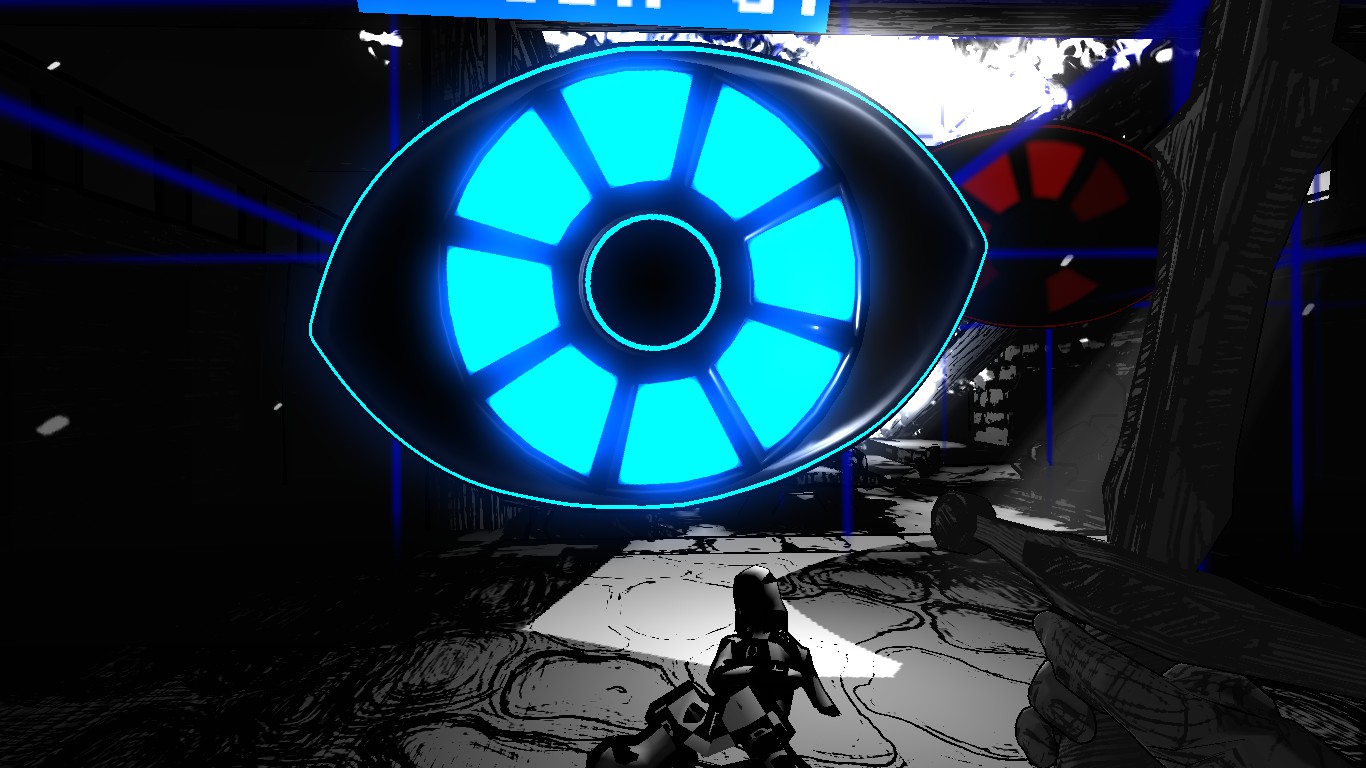 The mysterious voice has a vendetta against the Sky Bastards, which is what he calls the programmers (because they manifest in the game as floating polygonal eyes with rotating wait logo for irises, and he wants to use you to get revenge against them.
The mysterious voice has a vendetta against the Sky Bastards, which is what he calls the programmers (because they manifest in the game as floating polygonal eyes with rotating wait logo for irises, and he wants to use you to get revenge against them.
 Hotel Transylvania is a 2012 computer-animated children’s comedy by Columbia Pictures. The legendary vampire Dracula (Adam Sandler), after the death of his wife at the hands of humans, raises his daughter Mavis (Selena Gomez) as a single parent. Frightened of violent and unpredictable humanity, he has made a life for them by founding a five-star hotel in Transylvania just for monsters, and telling Mavis constant horror stories about the human world so she won’t to go. But it’s her 118th birthday now, which means she can make her own decisions and for some reason she still wants to go out into the world. To make matters worse, a human named Jonathan (Andy Samberg) somehow finds his way to the hotel and is not scared away by the monsters, and Jonathan and Mavis hit it off.
Hotel Transylvania is a 2012 computer-animated children’s comedy by Columbia Pictures. The legendary vampire Dracula (Adam Sandler), after the death of his wife at the hands of humans, raises his daughter Mavis (Selena Gomez) as a single parent. Frightened of violent and unpredictable humanity, he has made a life for them by founding a five-star hotel in Transylvania just for monsters, and telling Mavis constant horror stories about the human world so she won’t to go. But it’s her 118th birthday now, which means she can make her own decisions and for some reason she still wants to go out into the world. To make matters worse, a human named Jonathan (Andy Samberg) somehow finds his way to the hotel and is not scared away by the monsters, and Jonathan and Mavis hit it off.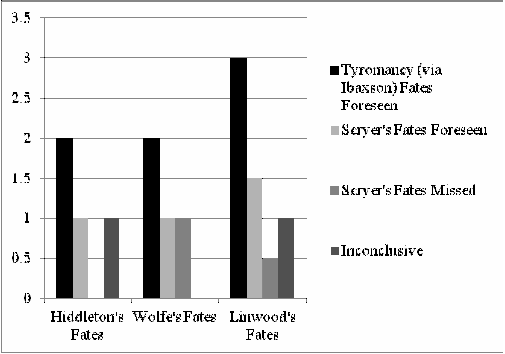


 Shrek The Musical is a theater version of the 2001 CG Dreamworks comedy adventure Shrek. As with the movie, the play is about the ogre Shrek who lives a contented secluded life in a swamp, but his solitude is interrupted with an influx of fairytale creatures who have been evicted by Lord Farquad to transform his kingdom into his perfect image of a kingdom. When Shrek goes to confront Farquad (meeting Donkey, a talking donkey on the way) he is coerced into mounting a rescue mission of Princess Fiona from a dragon-guarded tower to bring her back to be Farquad’s bride.
Shrek The Musical is a theater version of the 2001 CG Dreamworks comedy adventure Shrek. As with the movie, the play is about the ogre Shrek who lives a contented secluded life in a swamp, but his solitude is interrupted with an influx of fairytale creatures who have been evicted by Lord Farquad to transform his kingdom into his perfect image of a kingdom. When Shrek goes to confront Farquad (meeting Donkey, a talking donkey on the way) he is coerced into mounting a rescue mission of Princess Fiona from a dragon-guarded tower to bring her back to be Farquad’s bride.
 1. Max Max: Fury Road
1. Max Max: Fury Road 2. Star Wars: The Force Awakens
2. Star Wars: The Force Awakens_poster.jpg) 3. Inside Out
3. Inside Out 4. The Martian
4. The Martian 5. Ex Machina
5. Ex Machina

